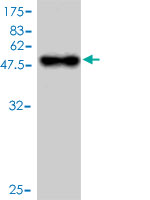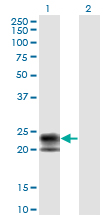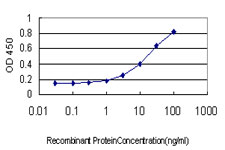TNFRSF17 Antibody (monoclonal) (M01)
Mouse monoclonal antibody raised against a full length recombinant TNFRSF17.
- 产品详情
- 实验流程
- 背景知识
Application
| WB, E |
|---|---|
| Primary Accession | Q02223 |
| Other Accession | BC058291 |
| Reactivity | Human |
| Host | mouse |
| Clonality | monoclonal |
| Isotype | IgG1 kappa |
| Clone Names | 1F10 |
| Calculated MW | 20165 Da |
| Gene ID | 608 |
|---|---|
| Other Names | Tumor necrosis factor receptor superfamily member 17, B-cell maturation protein, CD269, TNFRSF17, BCM, BCMA |
| Target/Specificity | TNFRSF17 (AAH58291, 1 a.a. ~ 184 a.a) full-length recombinant protein with GST tag. MW of the GST tag alone is 26 KDa. |
| Dilution | WB~~1:500~1000 E~~N/A |
| Format | Clear, colorless solution in phosphate buffered saline, pH 7.2 . |
| Storage | Store at -20°C or lower. Aliquot to avoid repeated freezing and thawing. |
| Precautions | TNFRSF17 Antibody (monoclonal) (M01) is for research use only and not for use in diagnostic or therapeutic procedures. |
For Research Use Only. Not For Use In Diagnostic Procedures.
Provided below are standard protocols that you may find useful for product applications.
BACKGROUND
The protein encoded by this gene is a member of the TNF-receptor superfamily. This receptor is preferentially expressed in mature B lymphocytes, and may be important for B cell development and autoimmune response. This receptor has been shown to specifically bind to the tumor necrosis factor (ligand) superfamily, member 13b (TNFSF13B/TALL-1/BAFF), and to lead to NF-kappaB and MAPK8/JNK activation. This receptor also binds to various TRAF family members, and thus may transduce signals for cell survival and proliferation.
REFERENCES
Identification of single nucleotide polymorphisms in the TNFRSF17 gene and their association with gastrointestinal disorders. Chae SC, et al. Mol Cells, 2010 Jan. PMID 20016944.Association between genetic variants in VEGF, ERCC3 and occupational benzene haematotoxicity. Hosgood HD 3rd, et al. Occup Environ Med, 2009 Dec. PMID 19773279.Gut-associated lymphoid tissue contains the molecular machinery to support T-cell-dependent and T-cell-independent class switch recombination. Barone F, et al. Mucosal Immunol, 2009 Nov. PMID 19741596.Local network topology in human protein interaction data predicts functional association. Li H, et al. PLoS One, 2009 Jul 29. PMID 19641626.Common variants at ten loci influence QT interval duration in the QTGEN Study. Newton-Cheh C, et al. Nat Genet, 2009 Apr. PMID 19305408.
终于等到您。ABCEPTA(百远生物)抗体产品。
点击下方“我要评价 ”按钮提交您的反馈信息,您的反馈和评价是我们最宝贵的财富之一,
我们将在1-3个工作日内处理您的反馈信息。
如有疑问,联系:0512-88856768 tech-china@abcepta.com.























 癌症的基本特征包括细胞增殖、血管生成、迁移、凋亡逃避机制和细胞永生等。找到癌症发生过程中这些通路的关键标记物和对应的抗体用于检测至关重要。
癌症的基本特征包括细胞增殖、血管生成、迁移、凋亡逃避机制和细胞永生等。找到癌症发生过程中这些通路的关键标记物和对应的抗体用于检测至关重要。 为您推荐一个泛素化位点预测神器——泛素化分析工具,可以为您的蛋白的泛素化位点作出预测和评分。
为您推荐一个泛素化位点预测神器——泛素化分析工具,可以为您的蛋白的泛素化位点作出预测和评分。 细胞自噬受体图形绘图工具为你的蛋白的细胞受体结合位点作出预测和评分,识别结合到自噬通路中的蛋白是非常重要的,便于让我们理解自噬在正常生理、病理过程中的作用,如发育、细胞分化、神经退化性疾病、压力条件下、感染和癌症。
细胞自噬受体图形绘图工具为你的蛋白的细胞受体结合位点作出预测和评分,识别结合到自噬通路中的蛋白是非常重要的,便于让我们理解自噬在正常生理、病理过程中的作用,如发育、细胞分化、神经退化性疾病、压力条件下、感染和癌症。








